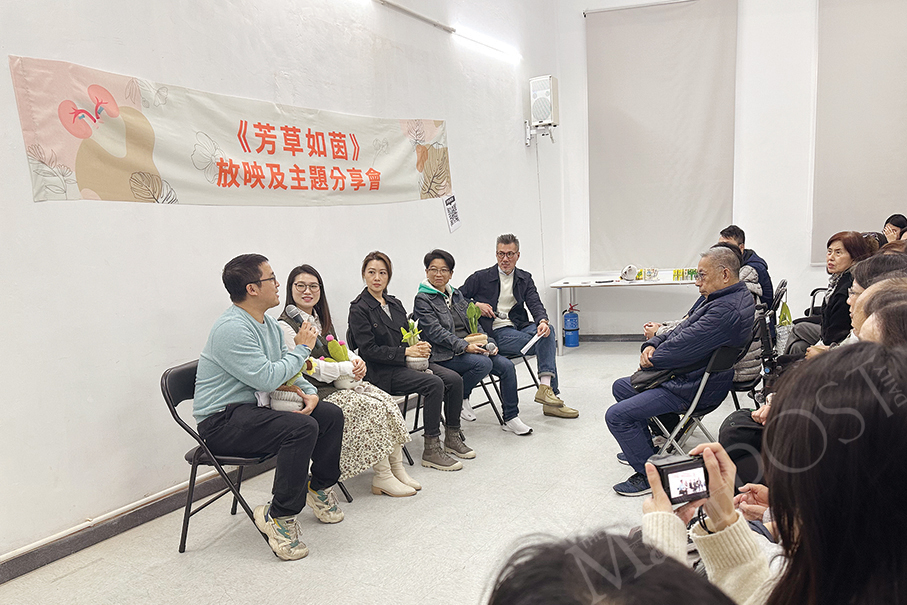Lawmaker Ron Lam U Tou raised yesterday concerns about the government’s vetting and approval criteria for medical assistance to dialysis patients and the effectiveness of its centralised organ donation registration system.
He pointed out that the number of residents suffering from kidney failure has been increasing annually, reaching an estimated number of 832 patients in 2023, whereas for the government’s organ donation registration system, which was launched in 2018, the total number of organ donation registrations as of Friday last week stood at 6,342, accounting for only about 1 percent of the local population.

Lawmaker Ron Lam U Tou (from left to right), the “Enduring Grace” documentary co-director Catherina Ho, Macau Renal Insufficiency Friendship Association Chairperson Long Sut Man, and the documentary’s featured person Anita, as well as Macau Synergy Association Chairman Johnson Ian Heng Ut address yesterday’s screening of the documentary at the lawmaker’s office in the city centre. – Photo: Yuki Lei
In his written interpellation, Lam, a directly-elected lawmaker-cum-current affairs commentator, highlighted the fact that the number of people suffering from kidney failure in Macau has been increasing annually, citing the Statistics and Census Bureau (DSEC) as pointing out that 136,358 dialysis treatments were provided in 2022, the 13th consecutive year of growth and 1.7 times more than in 2010. In 2023, Lam estimated, based on a typical haemodialysis session of three times per week, that 832 local residents were living with kidney failure with 129,859 dialysis treatments provided, a temporary decline due to the impact of the COVID-19 pandemic.
“Kidney disease is increasingly affecting younger generations,” noted Lam, who quoted kidney disease patients as saying that the youngest patient they had seen during their haemodialysis sessions was only about 11 years old.
According to Lam, kidney disease patients are now entitled to local residents’ lower charges for haemodialysis treatment at the public Conde de São Januário Hospital Centre, they still need to pay over 8,000 patacas every month, which, he said, with the trend of kidney disease becoming more common among young people nowadays, would exert tremendous financial pressure on kidney disease patients and their families in the long run.
The lawmaker stated that although there is a law in Macau that guarantees free medical treatment for local residents with financial difficulties, the law does not specify the criteria for medical assistance, urging the government to reestablish “reasonable, fair and transparent” criteria for approving medical assistance for dialysis patients. He also said that nearly 40 years have already passed since the promulgation of the relevant legislation, in view of which the government should re-examine the city’s healthcare policies and services, as well as conduct a public consultation on amending the relevant legislation.
Lam repeated his interpellation’s remarks during yesterday’s screening and sharing of the documentary “Enduring Grace” at his office.
The documentary, directed by Jody Lei (李文蕊) and Catherina Ho (何倩玲), takes Anita (庭茵), a patient suffering from end-stage chronic renal failure, as its subject, recording her real-life fight against the disease and her life journey, demonstrating her resilience and strength, and urging viewers to interpret the meaning and value of life from different perspectives. Filmed in 2021 and premiered last year, the documentary chronicles Anita’s three-year journey from regular dialysis to the dilemma posed by the COVID-19 outbreak and, finally, to the unexpected opportunity of a kidney transplant.
Addressing yesterday’s event, Macau Renal Insufficiency Friendship Association Chairperson Long Sut Man said that patients with kidney disease needed to have their kidneys dialysed three times a week, and the cost of each dialysis amounted to 700 patacas for local residents at the Conde de São Januário Hospital Centre and about 2,000 patacas at private hospitals, which was a great financial burden for patients with kidney disease as many of these patients tend to lose their jobs after diagnosis due to various reasons.
Currently, in line with the local medical legislation, only those who are pregnant, suffer from infectious diseases, a psychiatric condition or cancer, as well as primary and secondary school students, and persons aged 65 or above are provided with free medical treatment.
Long further pointed out that for most patients with end-stage renal failure, a kidney transplant is their best hope for a new life, “but the pace of arranging kidney transplants here is too slow”.
In this regard, both at yesterday’s event and in his interpellation, Lam criticised the “cumbersome” procedures for the registration of organ donations in Macau, resulting in the fact that out of the total number of 6,342 people who had expressed their wish to be organ donors online, only 4,322 of them completed the necessary procedures to be an officially registered organ donor.
Lam also quoted the government as pointing out that there have been eight cases in which potential donors meeting the diagnostic criteria for brain death, none of whom received consent from their families for organ donation, adding that not a single organ donation was carried out during the six years of operation of the city’s centralised organ donation registration system. He questioned whether the government has reviewed the circumstances of the past potential organ donation cases and proposed targeted improvement measures so that the local organ donation and transplant mechanism could be operated more effectively.
He urged the government to clarify whether its organ donation queue database was being updated regularly.








